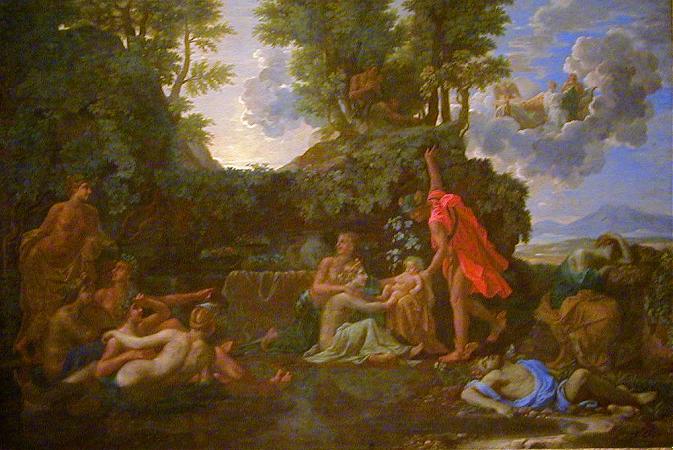Narcissus. In Greek mythology, Narcissus was a hunter from Thespiae in Boeotia who was known for his beauty. According to Tzetzes, he was a Laconian hunter who loved everything beautiful. Narcissus was proud, in that he disdained those who loved him, causing some to commit suicide to prove their devotion to his striking beauty. Narcissus is the origin of the term narcissism, a fixation with oneself and one's physical appearance or public perception. The name is of uncertain etymology. According to R. S. P. Beekes, he suffix clearly points to a Pre-Greek word. The word narcissus has come to be used for the daffodil, but there is no clarity on whether the flower is named for the myth, or the myth for the flower, or if there is any true connection at all. Pliny the Elder wrote that the plant was named for its fragrance not the youth. Narcissus was the son of the river god Cephissus and nymph Liriope. Several versions of the myth have survived from ancient sources. The classic version is by Ovid, found in book 3 of his Metamorphoses; this is the story of Echo and Narcissus. One day Narcissus was walking in the woods when Echo, an Oread saw him, fell deeply in love, and followed him. Narcissus sensed he was being followed and shoutedWho's there?. Echo repeated Who's there? She eventually revealed her identity and attempted to embrace him. He stepped away and told her to leave him alone. She was heartbroken and spent the rest of her life in lonely glens until nothing but an echo sound remained of her. Nemesis, the goddess of revenge, noticed this behaviour after learning the story and decided to punish Narcissus. Once, during the summer, he was getting thirsty after hunting, and the goddess lured him to a pool where he leaned upon the water and saw himself in the bloom of youth. Narcissus did not realize it was merely his own reflection and fell deeply in love with it, as if it were somebody else. Unable to leave the allure of his image, he eventually realized that his love could not be reciprocated and he melted away from the fire of passion burning inside him, eventually turning into a gold and white flower. An earlier version ascribed to the poet Parthenius of Nicaea, composed around 50 BC, was recently rediscovered among the Oxyrhynchus papyri at Oxford. Unlike Ovid's version, it ended with Narcissus who lost his will to live and committed suicide. A version by Conon, a contemporary of Ovid, also ends in suicide. In it, a young man named Ameinias fell in love with Narcissus, who had already spurned his male suitors. Narcissus also spurned him and gave him a sword. Ameinias committed suicide at Narcissus's doorstep. He had prayed to the gods to give Narcissus a lesson for all the pain he provoked. Narcissus walked by a pool of water and decided to drink some. He saw his reflection, became entranced by it, and killed himself because he could not have his object of desire. A century later the travel writer Pausanias recorded a novel variant of the story, in which Narcissus falls in love with his twin sister rather than himself. In all versions, his body disappears and all that is left is a narcissus flower. In 1898 Havelock Ellis, an English sexologist, used the term narcissus-like in reference to excessive masturbation, whereby the person becomes his or her own sex object. In 1899, Paul Näcke was the first person to use the term narcissism in a study of sexual perversions. Otto Rank, in 1911, published the first psychoanalytical paper specifically concerned with narcissism, linking it to vanity and self-admiration. Sigmund Freud published a paper exclusively devoted to narcissism in 1914, called On Narcissism: An Introduction. One of the personality disorders is called narcissistic personality disorder. The myth of Narcissus has inspired artists for at least two thousand years, even before the Roman poet Ovid featured a version in book III of his Metamorphoses. This was followed in more recent centuries by other poets and painters. In Stendhal's novel Le Rouge et le Noir, there is a classic narcissist in the character of Mathilde. Says Prince Korasoff to Julien Sorel, the protagonist, with respect to his beloved girl: She looks at herself instead of looking at you, and so doesn't know you. During the two or three little outbursts of passion she has allowed herself in your favor, she has, by a great effort of imagination, seen in you the hero of her dreams, and not yourself as you really are. The myth had a decided influence on English Victorian homoerotic culture, via André Gide's study of the myth, Le Traité du Narcisse, and the only novel by Oscar Wilde, The Picture of Dorian Gray.
more...











